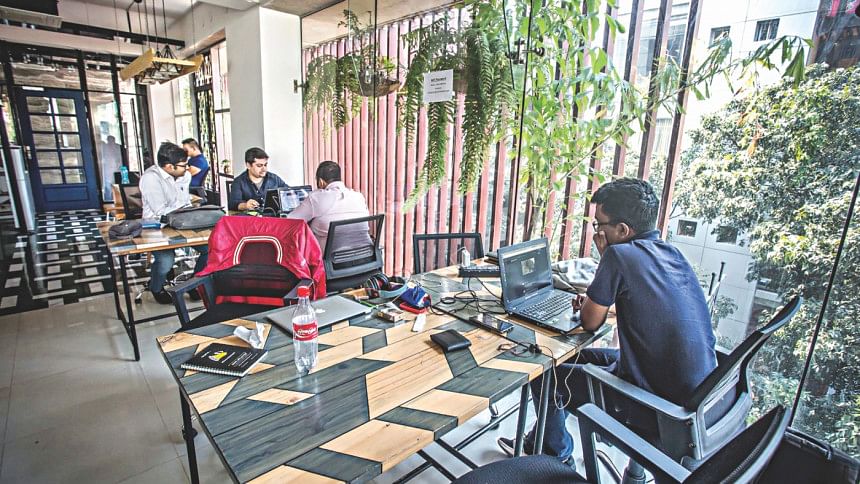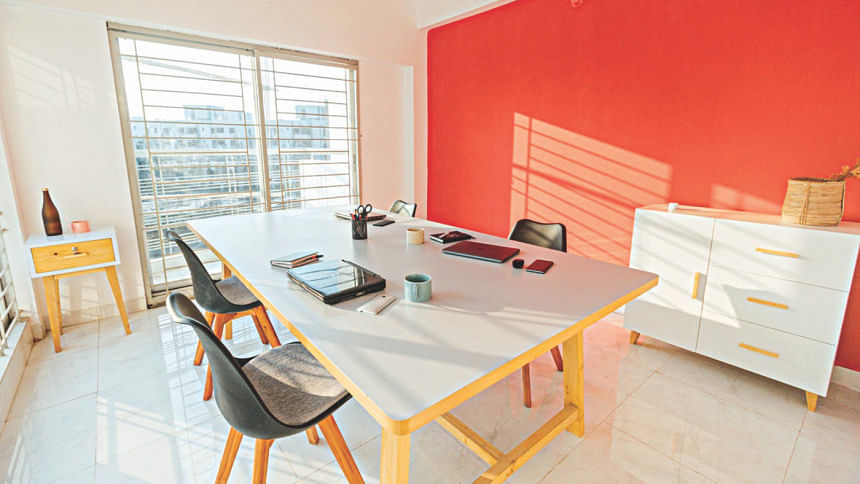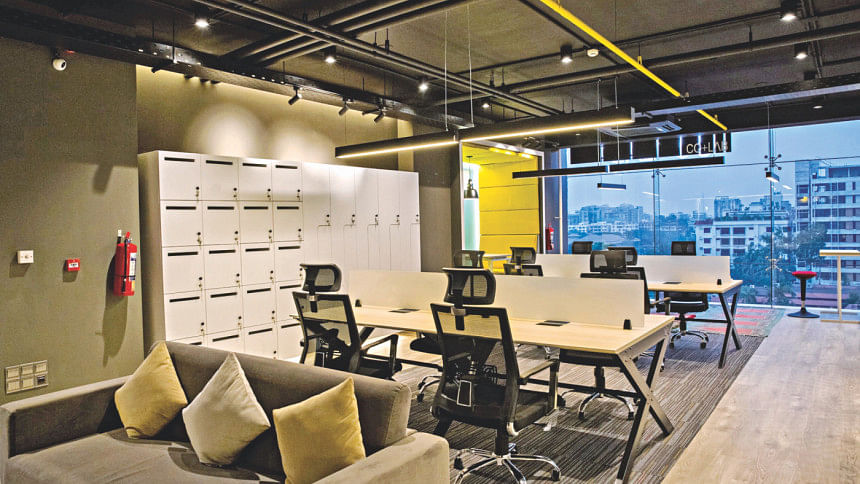Co-working spaces and the convenience of sharing

In the era of entrepreneurs and start-ups, Bangladesh is experiencing a growing need for convenient working spaces. This is where co-working spaces come in.
Co-working spaces are basically shared spaces where people, working in different fields, work independently or cohesively in groups. The first co-working space was in fact a hackerspace called C-Space, founded in 1995, where coders and digital enthusiasts worked together in a common space. Since the inception of the idea, it has spread worldwide to such an extent that August 9th 2010 has been declared as 'International Co-working Day'. While start-ups and freelancers are most commonly seen using these spaces, large companies and non-profit firms have used them all the same. Over 1.2 million people have worked at co-working spaces globally as of 2018.

Over the years, the number of co-working spaces has increased exponentially with some of the top companies worldwide generating some of the best brands in the world out of them. For example, WeWork in New York, gave rise to companies like Uber and Airbnb. Kaos in Berlin provides workshops and exhibitions alongside a workspace. There's Crew Collective in Montreal, which is arguably "the most beautiful co-working space" in the world. With the emergence of mass travel, co-working spaces in exotic getaway locations like Selina in Latin America and Impact Hub in Asia, it undoubtedly offers an enhanced networking opportunity unlike any other with the obvious pro being that you get to travel while at work.
Keeping up with the changing demands for workspaces, several co-working spaces have emerged in Bangladesh over the years with some notable examples being, HubDhaka, Bonik Co-working Space, Ink Studio, Colab Dhaka, and Moar. These co-working spaces are also located conveniently in places like Gulshan, Banani, Uttara, and Dhanmondi.
Ink Studio, a co-working space in Uttara, offers an assurance of community for start-ups and entrepreneurs in a city where such a space does not come cheap. Ink Studio acts as a venue for academic and creative professional courses and workshops in addition to being an affordable space for aspiring entrepreneurs. Arka Basak, founder of Ink Studio says, "As a co-founder of 212 Ink (a creative studio start-up), I had the first-hand experience of the immense pressure and struggle of finding a convenient and cost-effective office space in Dhaka. Hence, Ink Studio was founded both as a home for 212 Ink as well as a place for others to come and pursue ventures of their own."
Another well-known space, Colab Dhaka, aims to provide a dynamic mix of individuals a platform to connect and create. Located in Dhaka's diplomatic zone, it is placed 5-minutes' away from European embassies and American Centre. Shah Mohammad Adnan Haroon, the founder of Colab Dhaka, says, "Colab is designed to provide 360-degree support for a start-up to grow with the help of communities, investor access, networking events, legal and technical support".
One of the core features which makes co-working spaces worthwhile is their cost-effectiveness and cost-division feature. When asked about the positives, Fahim Murshed, CEO of Symbl who once worked at a co-working space, said, "Co-working spaces help save costs through its sharing model, such as, splitting rent, bills, and costs of various commodities which would have otherwise been added to your start-up capital. It allows you to focus your efforts much more on your company's operations." Other advantages include flexibility in terms of freedom from long-term lease commitments, convenient location, and sense of community as well as more networking opportunities. Companies also tend to book conference rooms in these spaces for private meetings. Overall, co-working spaces act as a convenient alternative, especially for freelancers and independent workers whose alternate options are often coffee shops or their homes.

As with all businesses, some disadvantages persist. Co-working spaces in Bangladesh have limited understanding of the different types of businesses, for instance, those working in creative or sports-related fields end up having to function in the same commercial drab spaces which are also utilised by 9 to 5 businesses. In terms of flexibility, companies often hesitate to provide extra working hours to their client companies and even if they do, it is often coupled with hidden costs. Moreover, clients that book conference halls in the spaces for meetings have to do so in time-based slots. Hence, while it isn't easy to predict the duration of such internal meetings, the timely slots often cause complications. Zarif Faiaz, Business Development Executive at HiFi Public, while sharing his experience of working at a co-working space in Dhaka said, "A few disadvantages included a lack of individual freedom to a certain degree with the honest truth being that impressing clients through co-working spaces rarely work. Regardless, the pros outweigh the cons in several aspects including convenience and cost-effectiveness."
While the aforementioned characteristics exist, this newly emerging business can improve in various aspects. For starters, while most first-entrants of this industry aimed to cater to big businesses, the growing trend of focusing on young entrepreneurs and start-ups shows renewed promise and opens up new opportunities. Newer co-working spaces should try to branch out their ideas instead of following the conventional business template of the existing ones in the country.
Co-working spaces act as a convenient solution for start-ups, with its variety of offerings, providing one-stop solutions to Dhaka's lack of convenient and affordable workspaces. The upside of networking and collaboration opportunities act as further motivators for using these spaces. Co-working spaces in the country still have a long way to go in terms of a few aspects, but the track they've embarked on shows promise of lasting growth.

 For all latest news, follow The Daily Star's Google News channel.
For all latest news, follow The Daily Star's Google News channel. 



Comments